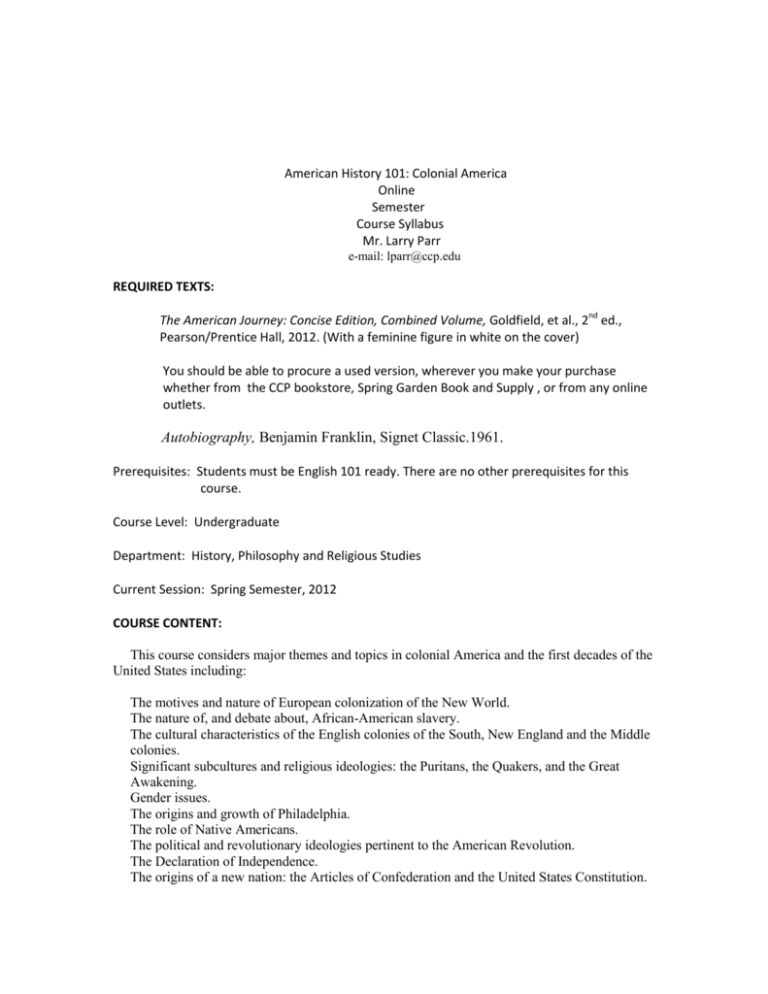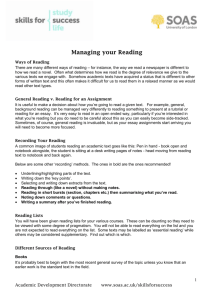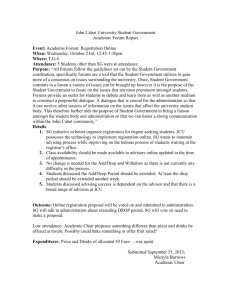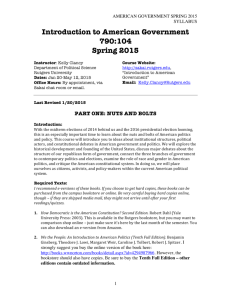
American History 101: Colonial America
Online
Semester
Course Syllabus
Mr. Larry Parr
e-mail: lparr@ccp.edu
REQUIRED TEXTS:
The American Journey: Concise Edition, Combined Volume, Goldfield, et al., 2nd ed.,
Pearson/Prentice Hall, 2012. (With a feminine figure in white on the cover)
You should be able to procure a used version, wherever you make your purchase
whether from the CCP bookstore, Spring Garden Book and Supply , or from any online
outlets.
Autobiography, Benjamin Franklin, Signet Classic.1961.
Prerequisites: Students must be English 101 ready. There are no other prerequisites for this
course.
Course Level: Undergraduate
Department: History, Philosophy and Religious Studies
Current Session: Spring Semester, 2012
COURSE CONTENT:
This course considers major themes and topics in colonial America and the first decades of the
United States including:
The motives and nature of European colonization of the New World.
The nature of, and debate about, African-American slavery.
The cultural characteristics of the English colonies of the South, New England and the Middle
colonies.
Significant subcultures and religious ideologies: the Puritans, the Quakers, and the Great
Awakening.
Gender issues.
The origins and growth of Philadelphia.
The role of Native Americans.
The political and revolutionary ideologies pertinent to the American Revolution.
The Declaration of Independence.
The origins of a new nation: the Articles of Confederation and the United States Constitution.
STUDENT LEARNING OUTCOMES:
Upon successful completion of this course, you will be able to:
1. Demonstrate understanding of the main events, topics and themes inherent in the
cultural, socio-economic, political and ideological patterns of colonial America and
develop some insight into the forces of historical change.
2. Define what is historically factual and to distinguish inference from opinion.
3. Recognize the range of interpretation in the discipline (historical revisionism) and
comprehend the varying arguments, voices, inferences, etc. within primary and
secondary historical texts.
4. Demonstrate understanding of the concept of historical revisionism.
5. Recognize the “clues” in primary texts and materials for a more informed analysis:
authorship; the purpose of authorship; intended audiences; the rhetorical devices
employed; the “story line;” possible interpretations of a piece unintended by the
author; connections with other texts; credibility, consistency and/or accuracy and to
realize that varied interpretations of such texts is probable.
6. Recognize the ethical commitment of the historian to alter an historical a priori or
hypothesis in light of research and evidence.
7. Recognize value in history for a greater understanding of the present and its importance
for making choices for the future.
8.
Demonstrate ability and confidence in voicing curiosity, responding to questions of
instructors or other students, being able to defend taken positions, and to apply the
protocols of intellectual discussion and debate in the weekly forums.
9. Demonstrate an ability to write coherently and analytically; to think and write like
historians.
10. Recognize the ethnic, racial, gender and religious diversity inherent in colonial America.
11. To demonstrate an ability to cipher historical maps pertinent to History 101.
READINGS:
A student of history should become adept in critically analyzing writings reflective of a given
cultural period. The aim here is not to merely accumulate facts via memorization, but to analyze
evidence, to apply this to various conditions and possibilities, and to draw the possible
conclusions. In order to fulfill this goal of critical analysis, you will read a blend of primary and
secondary readings: the former being writings created during a given cultural time period by a
product of that culture; while the latter are materials descriptive of a culture, although not
2
contemporaneous with it. For example, one could distinguish the eyewitness accounts of the
American Revolution from the present-day historians’ scholarship concerning that era.
The textbook is a blend of both primary (mostly on the CD supplied at the back of the
textbook) and secondary writings. In addition to the textbook, I will post a substantial number of
additional primary and secondary readings on the web site.
This is a reading-intensive course! Study questions will be provided with each reading
assignment to give you a basis for analyzing the material. You should be able to answer these
questions effectively before the forum discussions.
Finally, I will provide you with a weekly “Thoughts and Observations” segment to
compliment the textbook and online readings. These will be my input in content data, points to
consider when reading the material and ways to tie the readings together. You should complete
the readings sequentially as they are listed on the weekly assignment list (Timeline).
COURSE REQUIREMENTS:
The main course activities include reading, writing and the forum discussions.
Be advised that an F grade carries credit for any assignment, although unsatisfactorily,
while a zero does not; the grading system is A=100-90; B=89-80; C=79-70; D=69-60;
F=59-0.
ESSAY WRITING:
Essays involve the fulfillment of an assigned task requiring analyses of the assigned readings
and instructor’s comments and observations. Completed assignments must meet English
standards in grammar, coherence and paragraphing, which are expected of students at the
English 101 level, although English 101 is not a prerequisite for this course. Further guidance
about the writing component of this course is provided in the formal, more detailed syllabus
discussed in the first days of the course.
FORUM DISCUSSIONS
You will be expected to participate in our online forums (course web site) when held usually
once and occasionally twice a week. This will involve answering questions posed by the
instructor, asking pertinent questions or offering your analyses of other students’ assertions
(inferences). You should read all of the other students’ posts during the week and provide at
least one reply to another student. You will be graded for the thoughtfulness of your input, thus
you should not wait to the last minute in the week to participate. I recommend a daily log-on to
stay abreast of the forum activities. You will be informed of the deadline date for each forum.
Late posts will be penalized by lower grades and, if late beyond two days (or after my
assessment of the week’s forum responses), not evaluated and graded with a zero. Finally, posts
should be in standard English with care regarding spelling and text organization. Do not employ
3
“texting lingo.” The aim is to engage in a conversation using the protocols of academic
interaction.
SOME SUGGESTIONS FOR SUCCESS IN THIS COURSE:
You should write marginal notes in your readings, whether in the textbook or the document
handouts. Download the online articles, maps and study questions. Do not try to read from the
screen. In order not to deface a textbook, which you may want to sell, I recommend yellow tabs
used for messages placed in the margins. Notations could include main ideas of a paragraph,
references to earlier parts of the same reading, or connections made to other writings. Your
own personal responses are helpful too. Your thoughts are important and could contribute to
your forum involvement.
Your grade is based on your performance regarding the various requirements outlined
previously.
You should have a good college-level dictionary for reference while you study.
You must be involved with this course daily and follow the directions outlined by the syllabus
and the weekly sessions (Timeline and Forums).
Attendance is based on posting to the forums and completing writing assignments, beginning
with the first week. If a student does not post to any forum and/or complete writing
assignments within the first three weeks, she/he will be marked as “Never Attended” and be
automatically dropped from the course.
When preparing your essays, use a word processor, save and send to me. Do not do your
writing in the Assignment Text Entry Box because you could run out of time and be closed down
part way through your preparation of the assignment.
If you have a question or a problem with the course, contact me either through my college email address or our internal Web Study e-mail. If you have a technical problem use the Web
Study “Help” button or call the Office of Distance Education at 215-751-8415.
4
5









